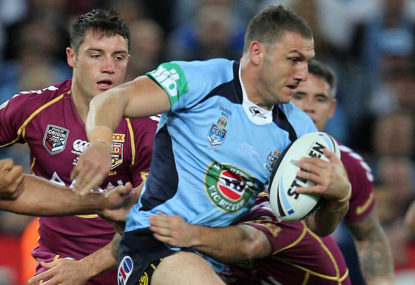Round 9 Team Lists Late Mail: Benji makes surprise call on Koroisau, Roosters trio OUT as Broncos sweat on Haas
All the team list information for Round 9.

Yep, that’s right. State of Origin is not a fair fight and never has been. The annual debate that goes on in rugby league circles tends to generate – and be fuelled by – more heat than light (to borrow a cliché).
Each year we hear about how refereeing decisions, unwise player selections and a whole host of other reasons dictate who wins and who doesn’t.
While all of this obviously perpetuates the melodrama that is Origin – as well as help sell papers and create blog hits – it largely obscures the fact that rugby league’s crown jewel actually isn’t an even contest.
Curiously, the disadvantage lies with Queensland, something all the more remarkable given they have just won their eighth consecutive series. And doesn’t it hurt.
There are two main reasons for this. First is the fact that New South Wales is theoretically a much stronger opponent. It has close to 75 percent of the NRL to choose from whereas Queensland only has close to 25 percent, if that.
This, obviously, means that the Blues have almost three times the amount of players to choose from, an advantage that starts to become glaringly apparent when you try and select a Queensland Origin third team and fourth team against the equivalents from New South Wales.
In addition to this superiority in numbers being an immense force multiplier, it also means that injuries and suspensions are always going to have a disproportionate impact upon the Maroons when compared to the Blues.
Statistically, at the very least, the Blues will always have more options to cover unavailable players, something that puts the Maroons behind the eight-ball from the outset.
This, incidentally, helps explain the myth of Queensland’s much-vaunted ‘loyalty’.
Let’s start with point one. Given its inferiority in depth, the Maroons have historically been forced to select the same players years after year, the principal reason being that there simply weren’t too many alternatives.
So all that verbal flatulence from Queensland about ‘loyalty’ is actually false. They’re ‘loyal’ because they can’t afford not to be.
The other main reason behind the Maroons’ disadvantage is, at once, both geographical and cultural. New South Wales created the game; it has run the game for the overwhelming majority of rugby league’s history, and it dominates rugby league media coverage in Australia.
With the exception of the ABC and The Roar at least two-thirds of rugby league commentary, opinion and analysis (a word that should be sued with caution) comes from Sydney-based sources.
Names like Craddock, Balym and Garry are clearly outnumbered by the usual suspects: Kent, Ritchie, Rothfield, Massoud, Hooper, Masters, Jackson, Webster…the list goes on.
Moreover, up until only recently, the vast majority of commentators on the only free-to-air television channel that shows rugby league games were from New South Wales.
Paul Vautin (the less said about his ‘contributions’ the better) and Wally Lewis were no match for the abundance of talking heads on Channel Nine, the biggest of which (pun intended) was the Blues’ most successful State of Origin coach in history, Phil Gould.
All of this translates into a crucial advantage for New South Wales. It means they can ‘dominate the narrative’ which is a wanker’s way of saying that they have a greater capacity to spin rugby league news coverage in a way that suits their own interests and agendas.
The ability to dominate the narrative means you have an advantage in the way you’re able to shape the debate to your own ends, as you have a bigger mouthpiece and therefore greater access to listeners, readers and viewers.
Consider, for example, the Daily Telegraph’s modus operandi. Queensland’s picked a bigger side? Then they are too slow and New South Wales will beat them with agility. Queensland’s picked a lighter side? Then the Blues will be too powerful.
Queensland’s picked a more experienced side? Then they are too old and past their best and NSW will win because of their youth and enthusiasm. Queensland wins a series?
Then the 50/50 calls went against NSW, the Blues were robbed and Queensland is cocky. Again, the list goes on.
That is not to say that only one state plays this game, because both certainly do. Rather it just points out that New South Wales are at an advantage when this very game gets played every year.
All in all, it doesn’t paint a terribly flattering picture for us. We have been beaten eight years in a row now, by an opponent that has half our player depth and a third of our media influence.
We have to get the Daily Telegraph and Channel Nine to help us sell out our stadiums – and during this time, embarrassingly – we then appoint an Immortal who in all fairness should have been made to wait behind Mal Meninga, Laurie Daley, Peter Sterling and Allan Langer, which was largely an effort to stem this changing tide against us.
We created the game, we basically run the game and we have much greater influence over the game…but we still find ourselves on the wrong side of the State of Origin ledger…year…after year…after year.
What’s wrong with this picture?
Again, it hurts. Don’t get me wrong. But it’s hard to argue with any of this.
Perhaps a better approach would be to simply marvel at a Queensland side that has enjoyed the unprecedented and unparalleled success it has, despite all the disadvantages that have been pointed out here.
So. Hats off to you Queensland. No shame in being beaten by the best. Well played sirs.